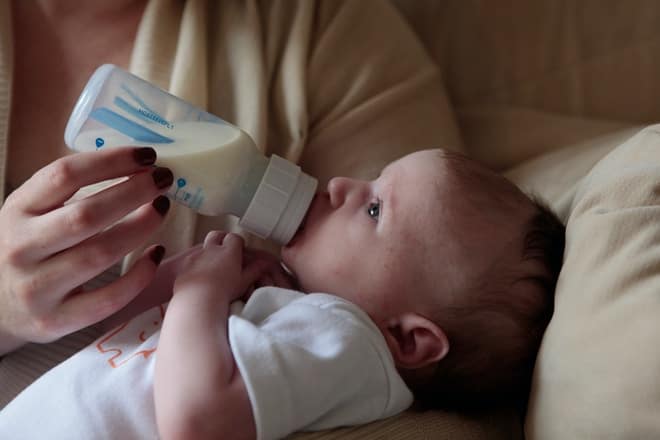The moment you leave the hospital after giving birth, you don’t just come home with your baby alone. Being a new parent means you will also be coming home with a long list of dos and don’ts. Trying to manage this list can be quite overwhelming and confusing.

The confusion worsens when it comes to feeding your little one. A major decision you have to make is to feed your baby with formula. Now, even this decision involves so many things, including the correct formula preparation guidelines.
Does cold formula upset baby’s stomach?
Read on below to learn the answer to this mind-boggling question.
Can Cold Milk Formula Upset the Stomach of Your Baby?
Cold formula and cold milk may cause indigestion among babies with stomach sensitivities. Once the stomach has cooled, this will slow down the process of digestion and it may lead to pain, cramping, and excessive gas.
The simplest way to prevent these problems is to never give refrigerated milk or formula to your baby. if you are traveling, you can use bottle warmers to ensure that the formula stays warm enough.

Is Cold Formula More Difficult to Digest?
Experts recommend that you should mix formula with not too hot water to ensure that you don’t burn the tongue and mouth of your baby. They even warn against giving cold milk to babies. In fact, doctors have noticed an increase in constipation issues among babies who are given cold milk.
They also warn against giving already cold formulas to babies because it might boost the number of gut bacteria that produce gas that may lead to colic or excessive gas.
Is It Safe to Give Cold Formula to My Baby?
Yes, of course, it is safe to feed cold formula to your baby. However, many parents opt to heat the milk of their baby, but it is primarily done depending on the preference of the baby or parent, and not really for health reasons or purposes.
Frozen or chilled baby formula, however, can offer teething babies some form of pain relief. If your baby is already teething and you are wondering how to do it, you can try to put some milk formula in an ice cube tray. Once it freezes, you can put the formula cube in the mesh feeder so your baby can enjoy it.
Even though there are a lot of parents who choose to warm the milk of their baby firm, the truth is that overheating might pose more risks compared to just letting your baby drink it while it is still cold.
Take note that you should avoid giving cow’s milk to your baby whether it is cold or warm. Cow’s milk is not recommended for babies until they reach one year old. Make sure that you just stick with breastmilk or formula until then.

What Will Happen If Baby Drinks Cold Formula?
So far, there is no evidence that warming up the formula first before giving it to your baby is any safer or healthier. However, babies also have their own preferences for the things they want to eat. Some babies simply don’t like the taste of colder formula.
Some mothers believe that drinking cold formula can upset the stomach of their baby. There is plenty of anecdotal evidence to back up this theory.
A lot of new parents have a hard time calming the stomach of their baby and it might require some trial and error to find the right formula that will reduce indigestion and gas.
When you have a newborn baby, it just makes perfect sense to experiment with warm formula first. To remove the initial chill from the feeding bottle of your baby, you can try to pour some warm water over it in the sink for a few seconds and swirl it around.
Another option is to fill a deep bowl with warm water and place the feeding bottle in it for several minutes. Although it is not scientifically required to give warm formula to your baby, new parents need to make some choices that will make their babies’ lives and their own lives happier.
Signs That Formula Upsets Your Baby
Your baby might be suffering from an upset stomach or tummy trouble when you notice any of the symptoms below:
- Constipation
- Crying or irritability after feeding
- Diarrhea
- Excess gas, burping, or fussiness after drinking formula
- Not wanting to eat or difficulty eating, and may also show up as a smaller appetite
Other significant symptoms of colic in infants include the following:
- Colicky infants may retain stool or have a distended belly.
- Excessive crying in a baby without any obvious cause, often starting in the evening which continues through the night.
- The crying usually changes pitch that may be painful for parents to hear.
- Fussiness that may seem to strike all of a sudden for no apparent reasons. Babies might also become irritable every time they are held.

Are Baby Bottle Warmers Necessary?
A lot of parents buy bottle warmers to help achieve the perfect temperature for the formula for their babies. Even if it might seem essential for any new parent, most experienced parents realized that this is not just the only option for them.
Most babies will even drink from the bottle when the formula is mixed with water at room temperature. You might be out of the house, and you have a bottle of water you use to mix the formula. A hungry baby will still drink the formula at room temperature although it might not be as warm if heated with a bottle warmer.
Now, it doesn’t mean that you cannot and should not buy a bottle warmer, though. Your baby might be very finicky and only prefer warm milk all the time. If this is the case, a bottle warmer is one of the best products you can add to your baby care arsenal.
The most important thing here is that baby formula must never be at a hot temperature. Test it first on your wrist to ensure that the baby formula is at body temperature.











